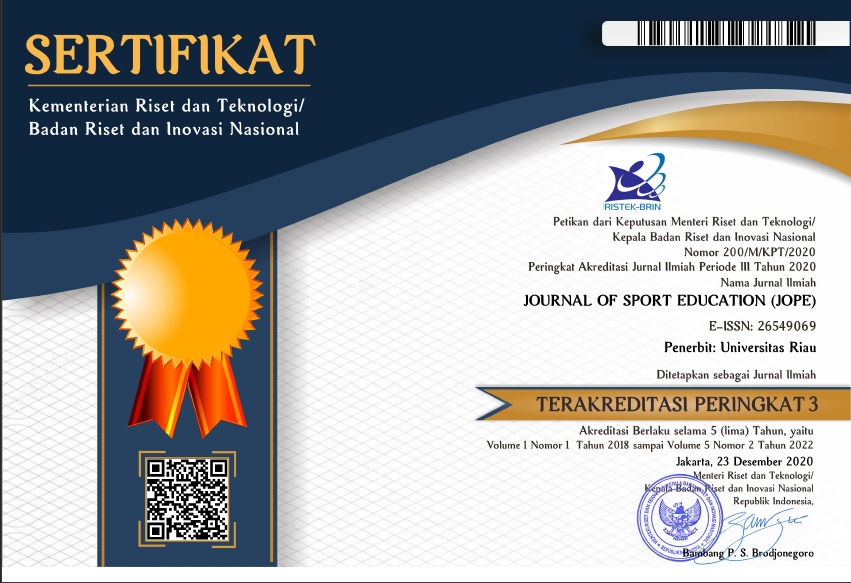E-learning di era pandemi covid-19: Bagaimana aksiologi hasil belajar pendidikan jasmani?
Abstract
Copyright © The Author (s) 2021

Keywords
Full Text:
PDFReferences
Aleksandrovich, V. S. (2013). Axiology of modern Russian education system. 52–57.
Ambiyar, Aziz, I., & Melisa. (2020). Perbedaan Kemandirian Belajar Siswa pada Masa Pandemi di SMAN 1 Lembah Melintang dan SMAN 1 Lembah Gumanti. Cendekia, 04(02), 1246–1258. https://j-cup.org/index.php/cendekia/article/view/367
Anas, A., & Fitriani, A. (2019). Dampak Media E-Learning Terhadap Kedisiplinan Dalam Mengerjakan Tugas Dan Motivasi. Pedagogy P-ISSN: 2502-3802 e-ISSN: 2502-3799 DAMPAK, 4(1), 74–82.
Apriyanti, N. (2020). Analisis Evaluasi Pembelajaran Daring Berorientasi. Jurnal Pendidikan Dasar.
Arikunto, S. (2009). Manajemen Penelitian. Rineka Cipta.
Chasanah, U. (2017). Ontologi, Epistemologi Dan Aksiologi. Tasyri’, 24(1), 76–91. uswatun_chasanah9@yahoo.com
Fauziyah, N. (2020). Dampak Covid-19 Terhadap Efektivitas Pembelajaran Daring Pendidikan Islam. Al-Mau’Izhoh, 2(2), 1–11.
Giatman, M., Siswati, S., & Basri, I. Y. (2020). Online Learning Quality Control in the Pandemic Covid-19 Era in Indonesia. Journal of Nonformal Education, 6(2), 168–175. https://journal.unnes.ac.id/nju/index.php/jne
Guangul, F. M., Suhail, A. H., Khalit, M. I., & Khidhir, B. A. (2020). Challenges of remote assessment in higher education in the context of COVID-19: a case study of Middle East College. Educational Assessment, Evaluation and Accountability, 32(4), 519–535. https://doi.org/10.1007/s11092-020-09340-w
Haerudin, H., Cahyani, A., Sitihanifah, N., Setiani, R. N., Nurhayati, S., Oktaviana, V., & Sitorus, Y. I. (2020). Peran Orangtua Dalam Membimbing Anak Selama Pembelajaran Di Rumah Sebagai Upaya Memutus Covid-19. Jurnal Stastistika Inferensial, 1–12.
HASANY. (2004). A Study On Allame Tabatabais View Of Axiology And Its Implications For Moral Educaton. (Vol. 34, Issue 2, Pp. 199–224). Journal Of Psychology And Education. https://www.sid.ir/en/journal/ViewPaper.aspx?id=35129
Hidayat, D. R., Rohaya, A., Nadine, F., & Ramadhan, H. (2020). Kemandirian Belajar Peserta Didik Dalam Pembelajaran Daring Pada Masa Pandemi Covid -19. Perspektif Ilmu Pendidikan, 34(2), 147–154. https://doi.org/10.21009/pip.342.9
Kemendikud. (2020). Surat Edaran Nomor 15 Tahun 2020 Tentang Pedoman Penyelenggaraan Belajar Dari Rumah Dalam Masa Darurat Penyebarana Corona Virus Disease (Covid-19).
Kusumadewi, R. F., Yustiana, S., & Nasihah, K. (2020). Menumbuhkan Kemandirian Siswa Selama Pembelajaran Daring Sebagai Dampak COVID-19 Di SD. JRPD (Jurnal Riset Pendidikan Dasar), 1(1), 7–13.
McGee, P. (2013). Supporting academic honesty in online courses. Journal of Educators Online, 10(1). https://doi.org/10.9743/JEO.2013.1.6
Raibowo, Septian; Eko Nopiyanto, Y. (2020). Journal STAND : Sports and Development. Journal STAND, 1, 49–55.
Raibowo, S., & Nopiyanto, Y. E. (2020). Proses Belajar Mengajar PJOK di Masa Pandemi Covid-19. 1, 49–55. http://jurnal.unipasby.ac.id/index.php/stand/about/submissions
Raibowo, S., Nopiyanto, Y. E., & Muna, M. K. (2020). Pemahaman guru PJOK tentang standar kompetensi profesional. Journal Of Sport Education (JOPE), 2(1), 10–15.
Rochman, B., Indahwati, N., & Priambodo, A. (2020). Identifikasi Keterlaksanaan Pembelajaran PJOK Tingkat SMP Di Masa Pandemi Covid 19 Se-Kabupaten Sidoarjo. Jurnal Ilmiah Mandala Education, 6(1).
Rochman, C., Nasrudin, D., Rokayah, R., Mulyani, S., Pertiwi, C. S. R., & Ginanjar, G. (2020). Distance Learning During the Covid-19 Pandemic: Strengthening of Character, Productivity, and Stem Competency. Jurnal Pena Sains, 7(2), 130–140. https://doi.org/10.21107/jps.v7i2.8261
Siregar, L. Y. S. (2017). Full day school sebagai penguatan pendidikan karakter (Perspektif psikologi pendidikan islam). Fikrotuna, 5(1).
Sirojudin, D., & Ashoumi, H. (2020). Aksiologi Ilmu Pengetahuan Manajemen Pendidikan Islam. Al-Idaroh: Jurnal Studi Manajemen Pendidikan Islam, 4(2), 182–195.
Soeprapto, S. (2013). An Axiological foundation of the indonesian national education system in the perspective of philosophy of education. Cakrawala Pendidikan, 2, 266–276.
Sulistyawati, T. E. (2020). Perspektif Aksiologi Terhadap Penurunan Minat Belajar Anak di Masa Pandemi. Aksiologi: Jurnal Pendidikan Dan Ilmu Sosial, 1(1), 33–43.
Suriasumantri, J. S. (2015). Filsafat Ilmu : Sebuah Apresiasi Terhadap Ilmu, Agama dan Seni. Pustaka Sinar Harapan.
Tomar, B. (2014). Axiology in Teacher Education: Implementation and Challenges. IOSR Journal of Research & Method in Education (IOSRJRME), 4(2), 51–54. https://doi.org/10.9790/7388-04235154
Wardi, M. (2013). Problematika Pendidikan Islam Dan Solusi Alternatifnya (Perspektif Ontologis, Epistemologis dan Aksiologis).
Winata, koko adya. (2020). Landasan Teori Pendidikan Karakter Disekolah (Tinjauan Ontologi, Epistimologi Dan Aksiologi. Jurnal Al Amar, 1(3), 50–56.
DOI: http://dx.doi.org/10.31258/jope.3.2.63-74
Refbacks
- There are currently no refbacks.











